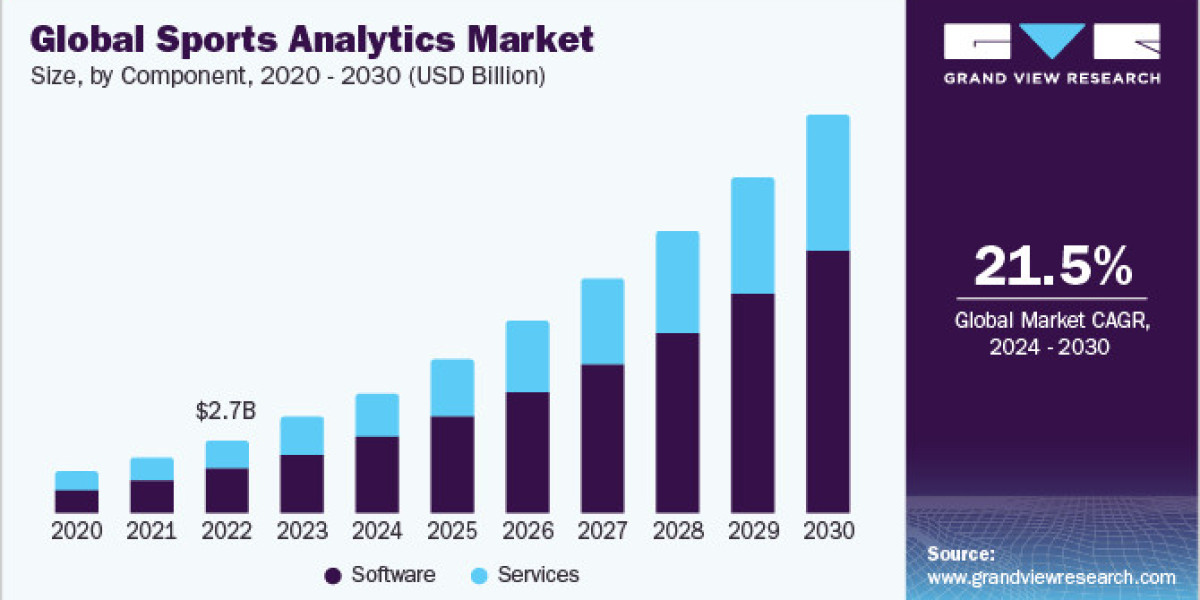The global sports analytics market was valued at USD 3.52 billion in 2023 and is expected to grow at a compound annual growth rate (CAGR) of 21.5% between 2024 and 2030. This growth is driven by the increasing importance of analytics tools for evaluating team performance, tracking individual players, monitoring injuries, and enhancing training programs. The rise of national and international sports events and leagues is also contributing to market expansion.
Wearable technology and sensors have significantly impacted the industry by enabling real-time tracking of athletes, which generates vast amounts of data on their movements, physiological metrics, and overall performance. This detailed data helps coaches and sports scientists optimize training and make better in-game decisions. Additionally, sports analytics plays a crucial role in improving fan engagement, with teams using data to create personalized content, interactive apps, and augmented reality experiences for fans.
Gather more insights about the market drivers, restrains and growth of the Global Sports Analytics Market
A notable advancement in technology includes the HANS device, a U-shaped composite material tool designed to prevent excessive head movement during crashes. Another development is the integration of GPS technology into sports equipment like golf and cricket balls, which tracks real-time performance and syncs data with mobile apps. For example, a GPS chip in a golf ball can monitor shot height and location, providing players with detailed performance feedback.
The need for precise decision-making is a major driver of market growth. Advanced tracking technologies and wearables allow teams to capture real-time, detailed information on players' movements, fitness, and physiological data. This empowers coaches to make informed decisions on training, injury prevention, and tactics, improving overall performance. For instance, Oracle Corporation and Red Bull Racing formed a partnership in 2022 to utilize Oracle Cloud's analytics to optimize training and enhance the fan experience.
The sports industry is undergoing a transformation with a focus on engaging fans in stadiums. Previously, in-stadium experiences revolved around live game action, but analytics are now being used to create personalized and immersive experiences. This shift is improving fan engagement while providing teams and sponsors valuable insights into fan behavior.
Component Insights
The software segment accounted for the largest share of market revenue in 2023, driven by large sports organizations adopting analytics software to assess player strengths and weaknesses. Software solutions like pre- and post-game analysis, motion and video analysis, data visualization, and predictive analysis generate sports data. Customized software solutions and developments in AR/VR, 2D/3D imaging, biometrics, and big data analytics are reshaping the software landscape.
The services segment is projected to grow at the fastest rate from 2024 to 2030, as more small sports clubs adopt analytics services to develop their playing style. Professional and managed services ensure the efficient use of analytics software, offering transparency and control throughout the process. With increasing demand for experienced analysts, service providers are helping teams grow and improve their core activities.
End-Use Insights
In 2023, sports betting accounted for the largest share of market revenue. This segment is undergoing rapid change due to technological advancements, with a shift toward data-driven decision-making. Advanced analytics and tools are helping bettors and organizations analyze player performance, team dynamics, and historical data, improving predictive models. Artificial intelligence and machine learning are further enhancing these models, giving bettors a competitive edge.
Media organizations are expected to experience the fastest growth from 2024 to 2030. With rising demand for real-time analysis and insightful content, media outlets are adopting advanced analytics tools to enhance sports coverage. Predictive analytics, player performance metrics, and interactive visualizations are now integral to sports content. Media organizations are using these tools to create data-driven narratives and remain competitive in the sports media landscape.
Analysis Insights
In 2023, on-field analysis held the largest share of market revenue. This segment involves analyzing data to improve in-game strategies, nutrition plans, and other methods to enhance athlete performance. On-field tools are widely used across different sports to assess performance and provide reliable insights to coaches and teams, which is essential for improving player health and safety.
Off-field analysis is projected to grow at a moderate pace from 2024 to 2030. This growth is fueled by the increasing interest from sports enthusiasts who seek a deeper understanding of game dynamics. Off-field analysis helps in formulating strategies and evaluating player performance beyond live play, with its data used in sports betting and fantasy gaming applications. Fan engagement platforms are also leveraging off-field analytics to build brand loyalty and foster deeper connections with fans.
Sports Insights
Football was the largest segment by market revenue in 2023, due to its global popularity and fan engagement. Teams and clubs are using sports analytics to improve performance, scouting, injury prevention, and fan interaction. Football's massive viewership and investment opportunities are driving the development of sports analytics technologies.
Cricket is expected to grow at the fastest CAGR of around 21% from 2024 to 2030. The sport has embraced technological advancements like HawkEye, Hotspot, and Snickometer. The International Cricket Council (ICC) has integrated these technologies into game coverage, with 32 cameras, including HawkEye, stump cameras, and Spidercams, offering 360° replays and real-time data. The ICC's mobile app and tournament website also provide rich data-driven visualizations, enhancing fan engagement and analysis.
Order a free sample PDF of the Sports Analytics Market Intelligence Study, published by Grand View Research.








